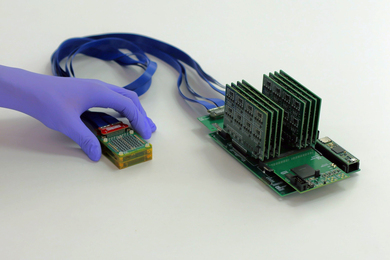Albert Einstein once said of his teaching style, “I never teach my pupils, I only attempt to provide the conditions in which they can learn.” That quote essentially describes how OBIE award-winning performer, writer, and interactive-electronics artist Andrew Schneider came to launch the inaugural season of the MIT Performing series, presented by the MIT Center for Art, Science and Technology (CAST), with the premiere of his work, "NERVOUS/SYSTEM."
The idea to bring Schneider to MIT originated with Josh Higgason, technical instructor in music and theater arts at MIT. His goal was to find artists who were “making some of the most interesting work out in the world, and bring it right to our student’s doorsteps.” Schneider’s theater work met that high mark.
The initial plan was to bring Schneider and his collaborators to MIT to present a piece from their repertoire; the proposal later evolved, bringing Schneider to MIT as a CAST visiting artist to present a new work in Building W97, MIT’s new, state-of-the-art theater arts facility. The piece launched MIT Performing, the new prototyping and presenting series curated by Jay Scheib, professor of Theater at MIT, which aims to promote research based artistic practices and serve as a new platform for contemporary performance.
The Premiere
The modern black box theater saw the premiere of "NERVOUS/SYSTEM" Nov. 9-11. The piece is the final part of a triptych that builds on two previous works from Schneider's "YOUARENOWHERE," which explored parallel universes, and "AFTER," a theatrical examination of shared consciousness.
To augment his independent research, Schneider spoke with MIT faculty and staff across departments, including mechanical engineering, brain and cognitive sciences, and philosophy. These discussions gave him a clearer understanding of space, time, and perception — ideas that would inform the structure and concepts in "NERVOUS/SYSTEM."
Schneider returned for a two-week residency at Building W97 in July, 2018, working closely with his recurring collaborators. The group continued to finesse the theatrical design and technical logistics for "NERVOUS/SYSTEM," using infrared video tracking and computer-controlled programming to stage complete blackouts, as well as to devise blocking schemes that create seamless scene changes, which play a critical role in "NERVOUS/SYSTEM."
Described as “synaptic theater” by one experimental theater devotee in the audience, "NERVOUS/SYSTEM" examines the way humans connect — or, more often, disconnect — through a series of seemingly random vignettes. Some scenes are literally seconds long before abruptly going black and quickly juxtaposing to an entirely different combination of performers in a new setting. These rapid scene changes often reflect the relentless bombardment of information that informs our technology-driven modern life.
Telling stories in new ways
While the technical effects were nothing short of astonishing, more striking is the ability of Schneider’s performers, who are called on to handle the constant movement of props and backstage logistics. In this way, "NERVOUS/SYSTEM" is more of an impressionist movement piece than it is theater, as the actors seamlessly execute complex scene changes while communicating emotionally complex storylines, often with few words. Their ability to focus gives the play its visceral power.
“With our theater, it may look very hyper-technical — and it is hyper-technical–but that is all in service of telling these stories in new ways,” says Schneider. “We’re trying to work on your brain, so instead of latching onto a narrative about this person who’s failing to achieve success in their life ... we try to work on you in a different way.”
Recurrent scenarios thread throughout the piece, such as the frustration the main character encounters when trying to engage their therapist or friends in meaningful conversation, or their repeated attempts to survey busy people in the street, with varying degrees of success. These misfired connections run through the heart of "NERVOUS/SYSTEM." “That’s what a lot of the work is about,” says Schneider. “The difficulty of communicating with other people in the world, and (how) that is leading to many of the problems that we have as human beings. And that’s what I think our work is trying to explore.”
Schneider says his experiences at MIT changed his concept of art, science, and technology and the ways in which those disciplines intersect. While much of that shift in thinking came from his one-on-one conversations, it’s also something he sees as “just in the air” at MIT.
“Everyone feels it — the whole cast and crew. Being here feels like more of a research laboratory than being in a warehouse space in Brooklyn. So we’re thinking about things differently here.”
"NERVOUS/SYSTEM" is presented by the MIT Center for Art, Science and Technology, with support from the Council for the Arts at MIT. The work is having a New York premiere at the Brooklyn Academy of Music this month.








